Best Shampoo for Dandruff: Ever felt those annoying white flakes at the worst times? Dandruff is more than a skin issue—it’s a problem that bothers millions, making them feel uncomfortable and self-conscious.
Choosing the right shampoo for dandruff is key. It’s not just about getting rid of flakes. It’s about making your scalp healthy and boosting your confidence. The market has many options, but not all are good.
Our guide helps you find the best dandruff shampoo. We looked at top picks like Nizoral with its 1% ketoconazole and Dove’s Dryness & Itch Relief Shampoo. These are proven solutions for your scalp.
Whether you see flakes sometimes or have ongoing scalp problems, this guide is for you. It’s time to say goodbye to those embarrassing flakes and hello to a healthier, more confident you.
Table of Contents
Understanding Dandruff: Causes and Symptoms
Dandruff is a common scalp condition that affects millions of people worldwide. Your scalp health is key to managing this issue. Knowing the causes and symptoms helps you find the right treatment.
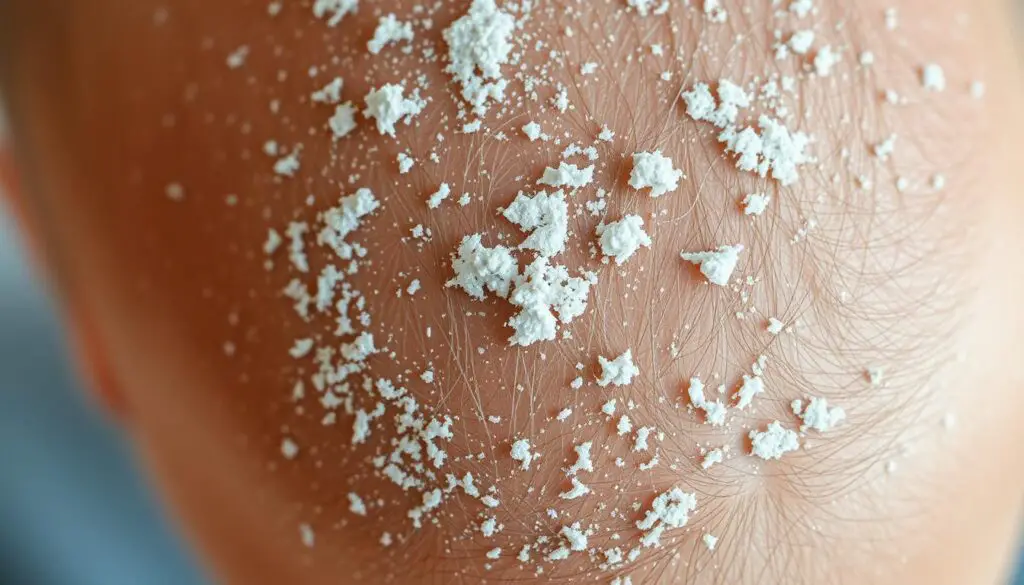
What Is Dandruff?
Dandruff is when your skin cells shed too fast, leaving white or yellow flakes on your scalp and hair. This happens when your skin cells renew too quickly, leading to flaking and scalp irritation.
Common Causes of Dandruff
- Overgrowth of Malassezia yeast on the scalp
- Seborrheic dermatitis
- Sensitivity to hair care products
- Hormonal changes
- Stress and diet
“Scalp care is not just about appearance, but about maintaining overall skin health.”
Symptoms to Look Out For
Spotting dandruff early helps manage your flaky scalp better. Look out for these symptoms:
- White or yellowish flakes on scalp and shoulders
- Itchy scalp
- Dry or greasy skin patches
- Redness and irritation
Dandruff affects different skin types in different ways. Oily skin might see greasy, yellow flakes, while dry skin has smaller, white flakes. Good scalp care and the right treatment can greatly improve your condition.
The Importance of Choosing the Right Shampoo
Finding the right shampoo for dandruff is more than just a purchase. It’s a key choice for your scalp’s health. Since about 50% of adults deal with dandruff, picking the right anti-fungal shampoo is crucial.
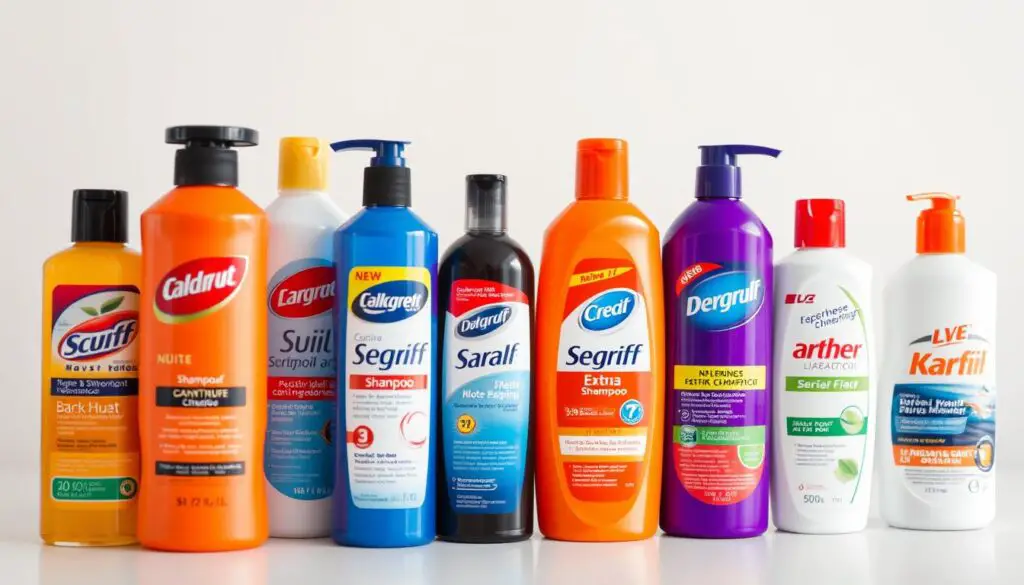
Your hair care routine affects your scalp health. Different shampoos target various scalp conditions. So, choosing the right ingredients is vital for effective treatment.
How Shampoos Impact Scalp Health
Dandruff shampoos tackle scalp problems. They can:
- Reduce yeast overgrowth
- Control excess oil production
- Remove dead skin cells
- Soothe scalp irritation
Why Ingredients Matter
The right ingredients can greatly improve your scalp health. An effective anti-fungal shampoo should have ingredients that meet your scalp’s specific needs.
| Ingredient | Effectiveness | Best For |
|---|---|---|
| Pyrithione Zinc | 90% yeast reduction | Fungal control |
| Salicylic Acid | 70% dead skin cell removal | Exfoliation |
| Selenium Sulfide | 50% flake reduction | Oil control |
“Choosing the right shampoo is like selecting a specialized tool for your scalp’s unique needs.” – Dermatology Experts
Knowing your scalp type and dandruff symptoms is crucial for the right hair care product. Personalized treatment can greatly improve scalp health and reduce dandruff symptoms.
Key Ingredients to Look For in Dandruff Shampoos
Finding the right dandruff shampoo can be tough. Your scalp’s health depends on the right ingredients. Let’s look at the best ones to fight flaking and irritation.
Pyrithione Zinc: Powerful Antifungal Defense
Zinc pyrithione is a top ingredient for dandruff. It fights fungal growth that causes scalp problems. Shampoos with 1% zinc pyrithione, like Jupiter Balancing Shampoo, reduce flaking and soothe scalps.
- Fights fungal infections
- Reduces scalp inflammation
- Helps control seborrheic dermatitis symptoms
Salicylic Acid: Exfoliation Powerhouse
Salicylic acid is a chemical exfoliant. It removes dead skin cells and clears hair follicles. Brands like Biolage Scalp Sync Anti-Dandruff Shampoo use 1% pyrithione zinc and 2% salicylic acid for full scalp care.
| Ingredient | Primary Function | Typical Concentration |
|---|---|---|
| Zinc Pyrithione | Antifungal Treatment | 1-2% |
| Salicylic Acid | Scalp Exfoliation | 2-3% |
| Ketoconazole | Severe Dandruff Control | 1-2% |
Ketoconazole: Addressing Severe Cases
Ketoconazole is strong for severe dandruff. It targets tough scalp conditions. It’s great for intense flaking or seborrheic dermatitis.
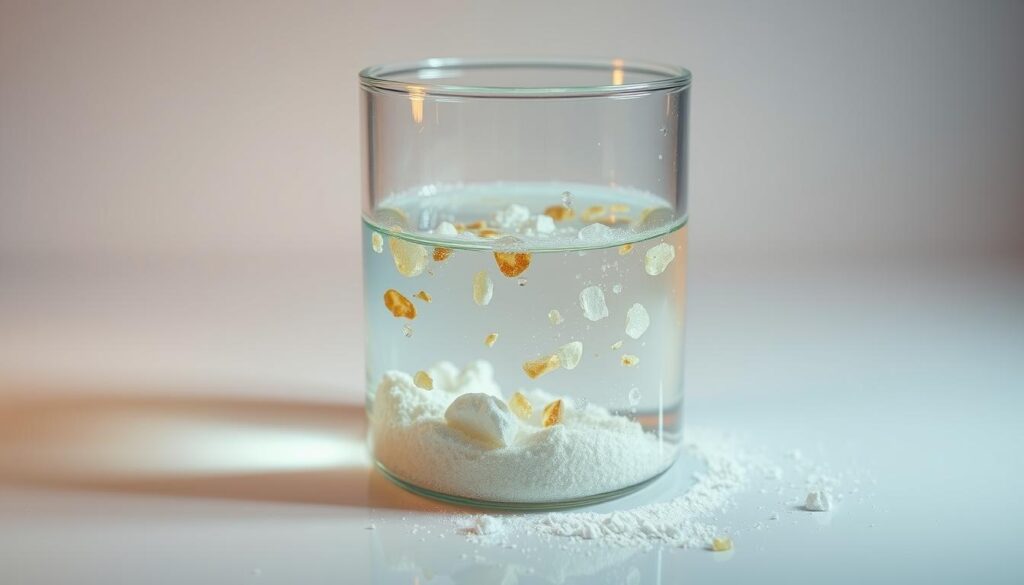
“Understanding your scalp’s specific needs is the first step to effective dandruff management.” – Dermatology Experts
The right mix of ingredients can change your scalp health. Always talk to a healthcare pro if dandruff doesn’t go away or gets worse.
The Best Dandruff Shampoos of 2023
Finding the right anti dandruff shampoo can change your scalp health and boost your confidence. We’ve picked the top products to help you fight off white flakes.
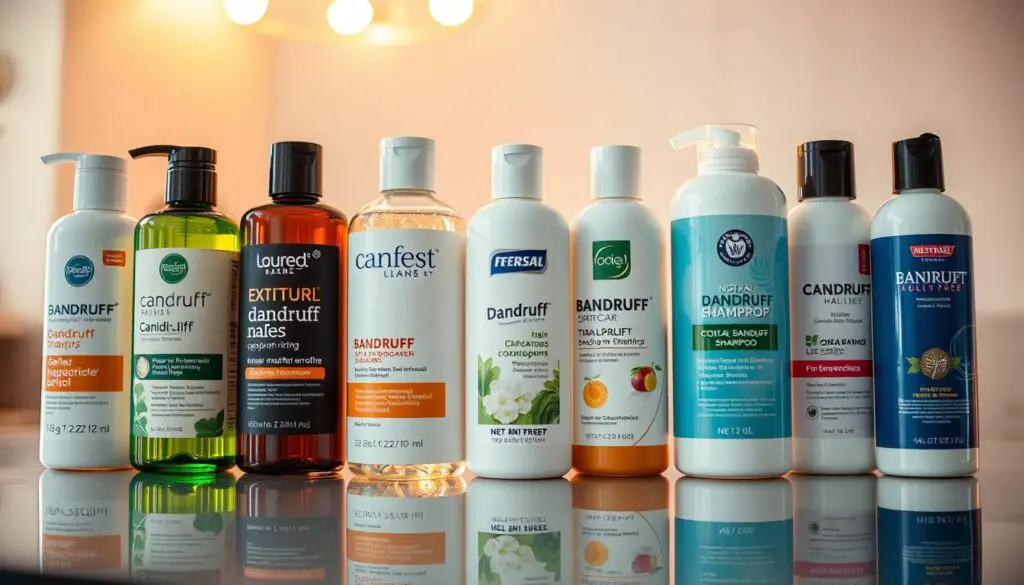
Top Performance Dandruff Shampoos
We’ve tested many anti dandruff shampoos to find the best for different scalp issues. Each one has special benefits to fight dandruff and improve scalp health.
| Shampoo | Key Ingredients | Price | Best For |
|---|---|---|---|
| Head & Shoulders Clinical Strength | Pyrithione Zinc | $12 | Severe Dandruff |
| Nizoral A-D Anti-Dandruff | Ketoconazole | $16 | Fungal Dandruff |
| Jupiter Balancing Shampoo | Pyrithione Zinc | $32 | Sensitive Scalps |
| Briogeo Scalp Revival | Charcoal, Tea Tree | $42 | Natural Ingredients |
What Makes These Shampoos Stand Out
- Clinically proven active ingredients
- Targeted scalp treatment
- Reduced flaking within weeks
- Gentle formulations for regular use
“Finding the right dandruff shampoo is about understanding your unique scalp needs”
When picking a dandruff shampoo, think about your scalp type and how bad your dandruff is. Some work better on oily scalps, while others are for sensitive skin.
Using the shampoo regularly and correctly is crucial for better scalp health. Try using two different shampoos to get the best results.
Natural Remedies: Alternatives to Commercial Shampoos
If you want to treat dandruff without harsh chemicals, natural remedies are a good choice. Many people use home ingredients to manage dandruff and care for their hair and scalp.
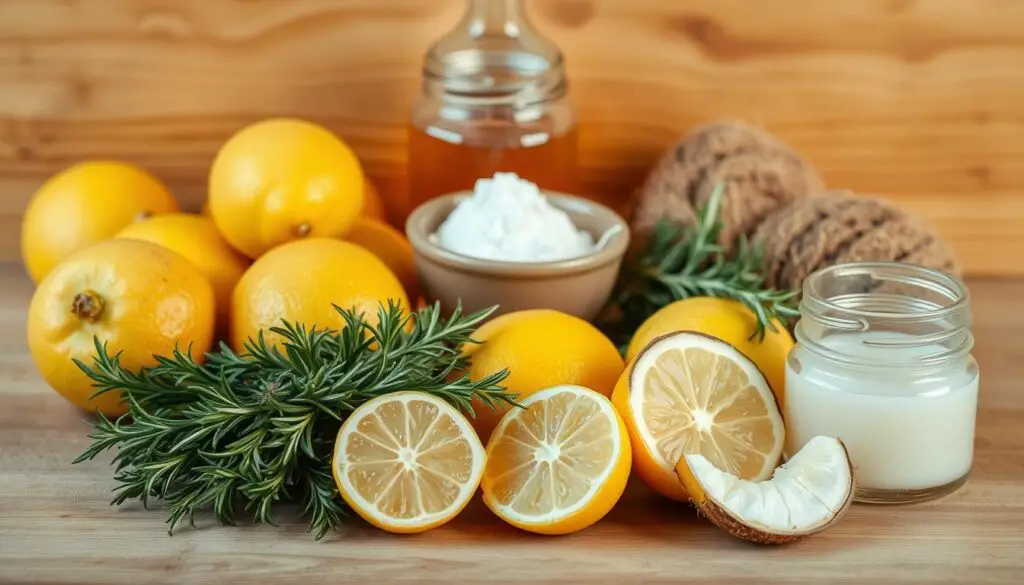
Tea Tree Oil: Nature’s Powerful Antifungal
Tea tree oil is a strong natural solution for dandruff. It has antifungal and antibacterial properties. These help fight the causes of scalp irritation.
- Reduces scalp inflammation
- Fights dandruff-causing microorganisms
- Helps control excess oil production
Aloe Vera: Soothing Scalp Care Solution
Aloe vera is great for hydrating and healing an irritated scalp. It’s a natural choice for gentle scalp care.
| Natural Ingredient | Scalp Benefits | Application |
|---|---|---|
| Tea Tree Oil | Antifungal, Antibacterial | 2-3 drops mixed with carrier oil |
| Aloe Vera | Hydrating, Anti-inflammatory | Direct gel application to scalp |
| Apple Cider Vinegar | pH Balancing, Cleansing | 50:50 mixture with water as rinse |
“Natural remedies can be powerful allies in your fight against dandruff.” – Dermatology Research Institute
When trying natural dandruff treatments, always do a patch test first. Also, talk to a healthcare professional if your scalp issues don’t go away. Everyone’s scalp is different, so what works for one might not work for another.
Evaluating Your Scalp Type
Knowing your scalp’s unique condition is key to finding the best dandruff treatment. Everyone’s scalp is different. Finding out what makes yours special helps you pick the right products for dry and itchy scalp issues.
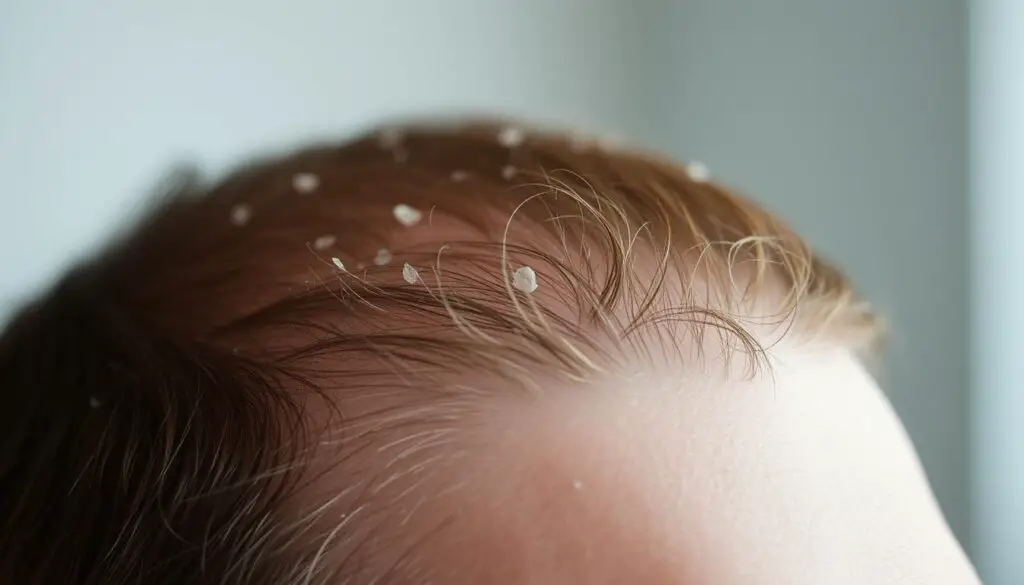
Identifying Your Scalp Characteristics
Scalp health depends on several factors. Some have oily scalps, while others have dry ones. It’s important to know which you have for the right treatment.
- Oily scalp: Shows signs of greasiness within 1-2 days after washing
- Dry scalp: Characterized by small, dry flakes and skin tightness
- Sensitive scalp: Prone to irritation from products and environmental factors
Understanding Scalp Type Challenges
An itchy scalp can come from many things, like product buildup and the environment. Nearly 50% of people experience some form of scalp issue. So, taking good care of it is very important.
“Knowing your scalp type is the first step to effective dandruff management” – Dermatology Experts
Balancing Your Scalp Health
A healthy scalp is clean, hydrated, and has good blood flow. For sensitive scalps, choosing the right products is crucial. It helps manage dry scalp and reduce irritation.
| Scalp Type | Key Characteristics | Recommended Care |
|---|---|---|
| Oily Scalp | Greasy within 1-2 days | Clarifying shampoos, frequent washing |
| Dry Scalp | Tight, flaky skin | Moisturizing treatments, gentle cleansing |
| Sensitive Scalp | Easily irritated | Hypoallergenic products, minimal ingredients |
If your scalp problems don’t go away, even after trying different treatments, see a dermatologist. They can give you advice tailored just for you.
How to Properly Use Dandruff Shampoo
Choosing the right dandruff shampoo is just the start. Knowing how to use it right can make a big difference. It can help you take better care of your scalp and fight dandruff more effectively.
Washing Techniques for Optimal Results
To get the most out of your anti-dandruff shampoo, follow these steps:
- Wet your hair well with warm water
- Put a small amount of shampoo on your scalp
- Massage it gently with your fingertips, not your nails
- Pay extra attention to areas with dandruff
- Let it sit for 3-5 minutes before rinsing

Recommended Frequency of Use
How often you use dandruff shampoo depends on your scalp and hair. Here’s a simple guide:
| Hair Type | Dandruff Shampoo Frequency |
|---|---|
| Coily or Curly Hair | Once per week |
| Fine or Straight Hair | 2-3 times per week |
| Oily Scalp | Every other wash |
| Dry Scalp | Once per week |
Experts say switching between regular and anti-dandruff shampoos helps avoid drying out your scalp. Always check the product’s instructions, as they can differ.
“Consistency is key in managing dandruff. Stick to a routine that works for your unique scalp condition.” – Scalp Care Specialist
Keep in mind, everyone’s results are different. If you don’t see changes in 2-3 weeks, talk to a dermatologist. They can give you advice tailored to your scalp.
The Role of Lifestyle in Dandruff Management
Managing scalp care is more than just the right shampoo. Your daily life greatly affects your scalp health and dandruff prevention. Knowing how diet, stress, and habits impact hair care can greatly reduce white flakes.

Dietary Tips for a Healthy Scalp
What you eat affects your scalp health. Some nutrients fight dandruff and boost hair wellness.
- Zinc-rich foods like lean meats and legumes
- Omega-3 fatty acids from fish and nuts
- Probiotics to balance skin microbiome
- Vitamin B complex for scalp health
“Your diet is a powerful tool in managing scalp conditions and promoting healthy hair growth.”
Stress Management Techniques
Stress can make dandruff worse. Using stress-reducing strategies can help scalp issues.
| Stress Management Technique | Benefit for Scalp Care |
|---|---|
| Meditation | Reduces cortisol levels |
| Regular Exercise | Improves blood circulation |
| Sleep Hygiene | Supports skin regeneration |
| Mindfulness Practices | Lowers inflammatory responses |
By adding these lifestyle changes, you can manage dandruff well. Remember, consistent care and mindful habits are essential for a healthy scalp and hair.
Common Myths About Dandruff
Dandruff can be frustrating and often misunderstood. Knowing the truth can help you find better ways to treat it. This way, you can manage your flaky scalp more confidently.
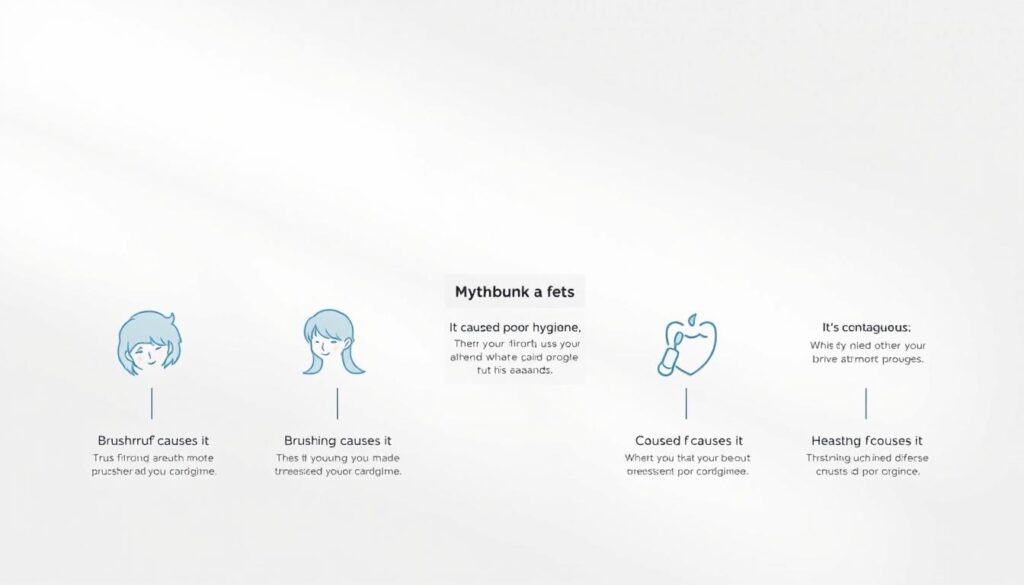
Separating Fact from Fiction
Many people don’t understand dandruff well. This leads to treatments that don’t work. Let’s look at some common myths:
- Myth: Dandruff is caused by poor hygiene
- Myth: You can cure dandruff permanently
- Myth: Only certain hair types get dandruff
Scientific Insights into Dandruff
Research shows dandruff is more complex than thought. It’s not just about how often you wash your hair. It comes from different factors, like:
- Skin cell turnover rate
- Scalp microbiome balance
- Individual skin sensitivity
| Myth | Scientific Fact |
|---|---|
| Dandruff is contagious | Dandruff cannot be transmitted between individuals |
| Apple cider vinegar cures dandruff | Limited scientific evidence supports its effectiveness |
| Only people with oily hair get dandruff | Dandruff affects various hair and scalp types |
“Understanding dandruff requires looking beyond surface-level assumptions and diving into scientific research.” – Dermatology Experts
Effective Approaches to Dandruff Management
Managing a flaky scalp often means using specific treatments. Products with pyrithione zinc, selenium sulfide, and ketoconazole are backed by science. They help address scalp issues effectively.
When to Consult a Dermatologist
Dandruff can be more than just a scalp issue. While many manage it with over-the-counter products, some need professional help. Knowing when to seek expert advice is key to avoiding complications and ensuring scalp health.
Recognizing Severe Dandruff Cases
Here are signs you should see a dermatologist for seborrheic dermatitis or persistent dandruff:
- Intense scalp itching that doesn’t improve with regular shampoos
- Visible inflammation or redness on the scalp
- Thick, crusty patches or scaling
- Dandruff that spreads beyond the scalp to face or ears
- Symptoms persisting longer than 2-3 weeks
Questions to Ask Your Dermatologist
Before your visit, prepare by asking these important questions about your scalp:
- Could my dandruff be a sign of a more serious skin condition?
- What diagnostic tests might help identify the root cause?
- Are there specific treatment options for my scalp type?
- How can I prevent future scalp issues?
“Early intervention can prevent chronic scalp problems and ensure long-term skin health.” – Dermatology Experts
About 50% of adults get dandruff at some point, but not all cases need medical help. A dermatologist can offer tailored advice, especially for severe or persistent symptoms of seborrheic dermatitis.
| Symptom Severity | Recommended Action |
|---|---|
| Mild Flaking | Over-the-counter shampoos |
| Moderate Itching | Consult primary care physician |
| Severe Inflammation | Immediate dermatologist consultation |
Remember, getting professional advice is vital for complex scalp conditions. Your dermatologist can offer treatments that meet your specific needs for scalp care.
Seasonal Effects on Dandruff
Your scalp’s health changes with the seasons. Winter, summer, spring, and fall each bring challenges that can cause dry scalp and itchiness. Knowing how weather affects your scalp is important for healthy hair and preventing dandruff.
Seasonal changes create different environments that affect scalp health. In winter, cold and dry air can make dandruff worse. Indoor heating also dries out the skin, leading to flaking.
Winter Scalp Challenges
- Dry air reduces natural scalp moisture
- Indoor heating strips essential oils
- Wearing hats can trap moisture and heat
- Potential increase in fungal growth
Managing Seasonal Scalp Changes
To fight seasonal dandruff, try these tips:
- Use a humidifier to keep air moist
- Switch to gentler, hydrating shampoos
- Reduce hot shower temperatures
- Apply leave-in conditioning treatments
“Your scalp is a living ecosystem that responds to environmental changes.” – Dermatology Experts
Summer also has its challenges. High humidity can make oil production go up, making itchy scalp worse. Sweat and sun exposure can also cause dandruff. Changing your hair care with the seasons helps keep your scalp healthy.
Year-Round Scalp Care Tips
Keep a consistent hair care routine that changes with the seasons. Use dandruff-specific shampoos, stay hydrated, and listen to your scalp’s needs all year.
Budget-Friendly Dandruff Shampoo Options
Looking for a good anti dandruff shampoo doesn’t have to be expensive. There are many affordable choices that can help you fight dandruff without spending a lot. Let’s check out some budget-friendly options that work well.
Many Americans deal with dandruff, with 51 percent facing it for more than two years. The bright side? You can find great dandruff shampoo at prices that won’t empty your wallet.
Affordable Brands That Work
- Head & Shoulders – Priced at $10, claims 100% protection against visible flakes
- Selsun Blue – $8 option with menthol for cooling relief
- CeraVe Scalp Relief 2-in-1 Shampoo – $10 with gentle formulation
- Dove Dandruff Shampoo – Incredibly affordable at $5
Drugstore vs. Salon Products
It might surprise you to know that drugstore brands often have the same ingredients as pricey salon products. For example, many cheap anti dandruff shampoos use pyrithione zinc. This ingredient fights dandruff well.
“Effective dandruff treatment doesn’t have to cost a fortune. The right ingredients matter more than the price tag.”
When picking your best shampoo for dandruff, look for these key ingredients:
- Pyrithione zinc (helps eliminate fungus)
- Salicylic acid (exfoliates scalp)
- Selenium sulfide (reduces skin cell growth)
Pro tip: Most budget-friendly shampoos recommend using the product 2-3 times weekly for optimal results.
While there are pricier options like Kérastase ($42) and Vichy Dercos ($29), you can manage dandruff well with drugstore brands costing $5-$10. Your wallet and scalp will appreciate it!
Prescription Dandruff Treatments
When over-the-counter treatments don’t work, prescription options are key for severe scalp problems. Dermatologists provide special treatments for tough cases of seborrheic dermatitis and scalp issues.
When Over-the-Counter Treatments Are Not Enough
Some people find dandruff hard to treat with regular shampoos. Signs you might need a prescription include:
- Persistent scalp inflammation
- Severe scaling and flaking
- Intense itching and discomfort
- Recurring seborrheic dermatitis
Prescription Treatment Options
Dermatologists can give strong medicines for scalp problems. These treatments have more active ingredients than over-the-counter options.
| Prescription Treatment | Active Ingredient | Average Cost |
|---|---|---|
| Ketoconazole Shampoo | Ketoconazole 2% | $60 for two 120 mL bottles |
| Ciclopirox Shampoo | Ciclopirox | $20 per month |
| Corticosteroid Shampoo | Fluocinolone | $40-$75 |
Prescription treatments are designed for tough dandruff and seborrheic dermatitis. Seeing a dermatologist can find the best treatment for your scalp.
“Not all dandruff is created equal. Professional medical guidance can transform your scalp health.” – Dermatology Research Institute
Doctor visits cost between $25 and $69. This makes professional help affordable for those with ongoing scalp problems.
The Impact of Hair Products on Dandruff
Your hair styling routine might be secretly sabotaging your scalp health. Many hair care products can contribute to dandruff by creating buildup and irritating your sensitive scalp. Understanding how these products interact with your hair and scalp is crucial for maintaining a healthy, flake-free environment.
Styling Products: Weighing the Risks
Not all styling products are created equal when it comes to scalp care. Some can trigger dandruff or make existing conditions worse. Let’s explore the potential impacts:
- Gel and mousse can create residue that clogs hair follicles
- Hairsprays might leave sticky buildup on the scalp
- Heavy styling creams can trap moisture and encourage fungal growth
Finding a Balance Between Style and Scalp Health
Your desire for perfectly styled hair doesn’t mean you must compromise scalp care. Here are smart strategies to minimize product-related dandruff risks:
- Choose water-based styling products
- Wash styling products out thoroughly
- Use clarifying shampoos periodically
- Select scalp-friendly, lightweight formulations
| Product Type | Scalp Impact | Recommended Frequency |
|---|---|---|
| Hair Gel | High Buildup Risk | Use sparingly |
| Mousse | Moderate Buildup | 1-2 times weekly |
| Lightweight Spray | Low Scalp Impact | As needed |
“Healthy hair starts with a healthy scalp” – Dermatology Experts
Remember, your scalp is delicate. Prioritize hair care products that support scalp health while allowing you to express your personal style. With careful selection and mindful application, you can achieve beautiful hair without compromising your scalp’s well-being.
Maintaining a Healthy Scalp Long-Term
Creating a lasting hair care routine is key for scalp health and stopping dandruff. Your scalp care plan should include regular treatments and upkeep. Knowing your scalp’s needs helps you create a routine that keeps your hair clean and flake-free.
Regular scalp checks are vital in your hair care plan. Experts say to check your scalp weekly for signs of dryness, irritation, or flaking. Use products like Head & Shoulders Royal Oils Moisture Boost Shampoo or Selsun Blue for scalp issues. Look for shampoos with Pyrithione Zinc to help keep your scalp healthy.
Your hair care routine should change with the seasons and your scalp’s needs. Switch between medicated and regular shampoos, like using Nizoral every three days, then once a week. Watch how your scalp reacts and adjust your plan as needed. If dandruff keeps coming back, see a dermatologist for specific advice.
Scalp health is more than just shampoo. Eat well, manage stress, and protect your scalp from harsh weather. By making scalp care a long-term commitment, you can stop dandruff and keep your hair healthy all year.
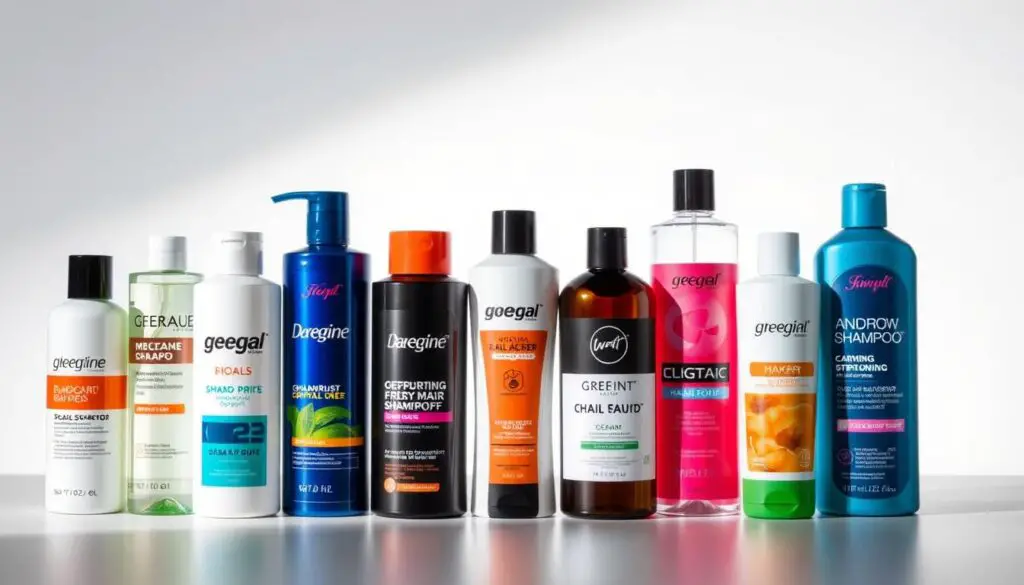
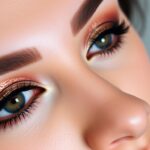
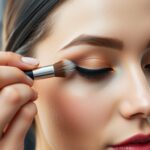
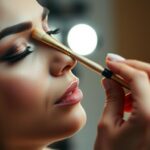
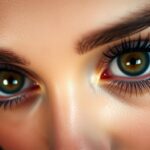


1 thought on “Best Shampoo for Dandruff: Expert Picks”